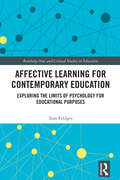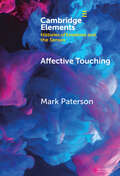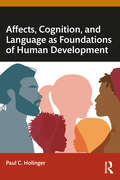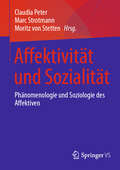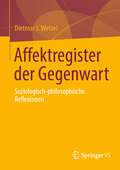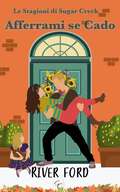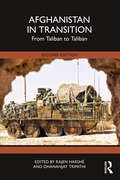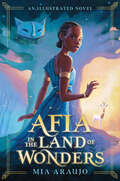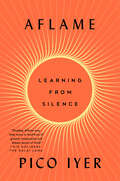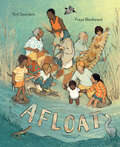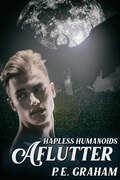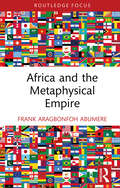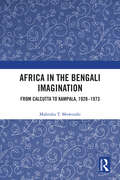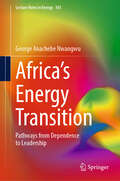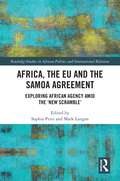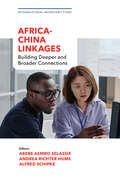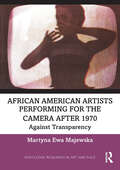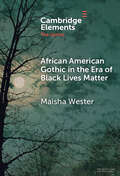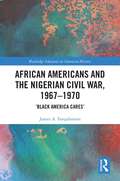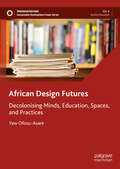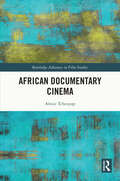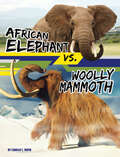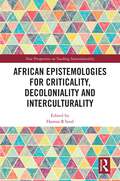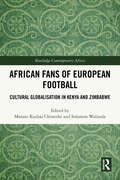- Table View
- List View
Affective Learning for Contemporary Education: Exploring the Limits of Psychology for Educational Purposes (Routledge New and Critical Studies in Education)
by Tom FeldgesThis book dissects the relationship between the disciplines of Psychology and Education Studies to provide a new and critical perspective on the usefulness of psychological research and theory for educational purposes.Assuming that affective states form an important part of how humans relate to their environment, this book posits that the currently dominant cognitive approach to the field of psychology is unable to account sufficiently for this experiential reality of human life. Providing a philosophical investigation of this disparity, chapters offer an in-depth discussion of affective states for transformative learning, chart the journey of Psychology as an independent academic discipline, and engage classical learning theories in order to offer a broader understanding of complex, field-specific arguments, and engage readers from multidisciplinary backgrounds. Provoking a true paradigm shift in the field of Education Studies based on its own theoretical underpinnings, this book ultimately initiates a partnership between both disciplines to demonstrate a progressive and radical approach to the way we teach and think about the field of education studies.This cutting-edge book will be of relevance to scholars, researchers, and postgraduate students in the fields of Education Studies, educational psychology, the theory of education, and the philosophy of education more broadly. Senior professionals and academics who wish to expand their knowledge in relation to the international literature of this field would further benefit from this volume more broadly.
Affective Touching: Neurobiology and Technological Applications (Elements in Histories of Emotions and the Senses)
by Mark PatersonAt the end of the twentieth century the discovery of 'slow', affective touch nerves in humans known as C Tactile (CT) afferents, which are entirely separate from the faster pathways for touching objects, had huge social implications. The Swedish neuroscientists responsible formulated an “affective touch hypothesis” or “social touch hypothesis” to consider their purpose. Part I offers a history of the science of social touch, from related discoveries in mammals by physiologists in the 1930s, to the recent rediscoveries of the CT nerves in humans. Part II considers how these findings are being intentionally folded into technologies for interaction. First, as mediated social touch, communicating at a distance through haptics. Second, with the increasing number of social and service robots in health care and domestic settings, the role of affective touch within human-robot interaction design.
Affects, Cognition, and Language as Foundations of Human Development
by Paul C. HolingerAffects, Cognition, and Language as Foundations of Human Development considers human development from the three most basic systems—affects (our earliest feelings), cognition, and language. Holinger explores how these systems enhance potential and help prevent problems, both in individuals and in societies.He begins with a focus on the affects of interest and anger and how affects provide the foundation for the sense of self and playing and creating. The author delves into cognition in the context of human relationships and infants’ remarkable capacity to understand language long before they can talk. Drawing on the work of Darwin, Freud, Stern, Basch, and the ground-breaking ideas of Silvan Tomkins, this work thus deepens the exploration into human development by integrating affects, cognition, and language. The author also uses this triad to examine two important societal issues: physical punishment, and bias, prejudice, and violence.This book will not only appeal to psychologists, psychoanalysts, psychiatrists, and social workers but is also accessible to parents, educators, and policymakers.
Affektivität und Sozialität: Phänomenologie und Soziologie des Affektiven
by Claudia Peter Marc Strotmann Moritz Von StettenAffekte bestimmen unser soziales Zusammenleben. In Form von Empfindungen, Stimmungen und Sensibilitäten sind sie Ausdruck unserer Berührbarkeit und Empfänglichkeit, sie schärfen unsere Aufmerksamkeit, lenken unsere Wahrnehmung oder treffen uns in unserer Verletzlichkeit. Über sie und mit ihnen erschließen wir uns selbst, andere und die Welt. Die affektiven Dimensionen des Sozialen sind infolge des affective turn Gegenstand neuerer interdisziplinärer Forschung. Anliegen des Buches ist es, das Potential der Phänomenologie innerhalb der Affektforschung anhand theoretischer und empirischer Fallstudien aufzuzeigen. Der Band versammelt Beiträge aus der Philosophie und Soziologie, die unter anderem an phänomenologische Ansätze von Husserl, Scheler, Merleau-Ponty, Patočka, Levinas, Waldenfels, Schmitz und Ratcliffe anknüpfen. Damit ermutigen die Texte des Bandes zu einem verstärkten Dialog zwischen philosophischer Reflexion und empirischer Sozialforschung.
Affektregister der Gegenwart: Soziologisch-philosophische Reflexionen
by Dietmar J. WetzelAffekte, Emotionen und Gefühle sind allgegenwärtig. Sie bestimmen nicht nur unseren Alltag, sie sagen auch viel darüber aus, wer wir sind, beziehungsweise wer wir zu sein glauben. Ein «Affektregister der Gegenwart» klärt exemplarisch-systematisch über gegenwärtige und historisch gewachsene Gefühlslagen respektive affektive Zustände der Gesellschaft auf. Um dies zu veranschaulichen, werden zahlreiche Affekte und Emotionen einzeln, aber auch in ihrer Wechselwirkung soziologisch-philosophisch analysiert. Dies geschieht im Sinne einer interdisziplinär ausgerichteten Ab- und Aufklärung über die Befindlichkeiten, Erregtheiten und Ansteckungsverhältnisse, die von Affekten und Emotionen nicht nur beeinflusst, getragen und gesteuert, sondern auch von diesen erzeugt und verbreitet werden. Eine Aufarbeitung und Einsicht in unser Affektregister (und deren Manifestationen) ist unerlässlich, um zu verstehen, wie Menschen und Gruppen in bestimmten Konstellationen und Situationen empfinden, was sie zu sozialen Praktiken (unbewusst) motiviert und wie Menschen mit den dabei entstehenden Gefühlslagen bei sich und bei anderen produktiv umgehen.
Afferrami se Cado (Le Stagioni di Sugar Creek #2)
by River FordDarcy Fletcher non riesce a trovare la sua strada. Ha finito tutti i corsi generali all’università ma non sa in cosa specializzarsi. Forse accettare un lavoro come tata questo autunno sarà un modo migliore di impiegare il suo tempo. Il nuovo allenatore del liceo, Evan Porter, ha deciso che vuole crescere la sua bambina di cinque anni nella piccola città di Sugar Creek. Ma ha bisogno di un aiuto durante la stagione di football. Una delle Madrine di Sugar Creek gli trova una tata: Darcy è giovane, impulsiva, piena di energia e troppo attraente. Non riesce a smettere di pensare a lei, ma Evan ha già imparato in passato che l'amore giovane non dura, e lui non sarà un uomo di passaggio per Darcy. Darcy scoprirà di appartenere a Evan o la loro differenza di età sarà un ostacolo troppo grande per lui?
Affordable Housing in the United States
by Gregg Colburn Rebecca J WalterAffordable Housing in the United States addresses the issue of affordability of housing, or the lack thereof, going beyond conventional policy discussions to consider fundamental questions such as: What makes housing affordable and for whom is it affordable? What are the consequences of a lack of affordable housing? How is affordable housing created? And what steps can be taken to ensure all people have access to affordable housing?With the understanding that different households face different challenges, the book begins by breaking down the variables relevant to the study of affordable housing, including housing costs, household income, geographic location, and market forces, to help readers understand and quantify affordability at the individual and societal level. Part II examines the consequences of unaffordable housing, highlighting racial inequities in housing access and affordability, and multiple forms of housing precarity including eviction and homelessness. Part III explores the entities involved in providing affordable housing such as local and federal governments, regulatory agencies, non-profit organizations, and for-profit developers. In Part IV, case studies from US cities demonstrate the complex web of organizations, policies, and market conditions that influence housing affordability, revealing substantial regional variations in access and policy response. Part V proposes a future roadmap and outlines four potential states with radically different outcomes for the affordable housing system in the United States.An ideal book for graduate and undergraduate courses in economics, public policy, real estate finance and development, sociology, and urban planning, this title will also be of value to professionals and policymakers seeking to understand and improve housing affordability and access.
Afghanistan in Transition: From Taliban to Taliban
by Rajen Harshé Dhananjay TripathiOwing to its geo-strategic location and mineral wealth, Afghanistan has acquired significance in the inter-state politics of Asia as well as world politics during the past decades. This book discusses the Taliban’s return which outlines the recent and current developments in contemporary Afghanistan. The essays in this volume: Locate Afghanistan under globalisation and reflect on the state and nation-building efforts in Afghanistan by shedding light on the status of citizens, especially women Analyse how the Taliban survived in all these years, and how it returned to power Examine Afghanistan’s relations with major powers like the USA, China, and India and explore the intricacies of ties between India, Pakistan, and Afghanistan within the Indian subcontinent Shedding light on a threshold moment in 21st Century world politics, this work will be useful to scholars and researchers in political science, international relations, sociology, area studies, and the interested general reader.
Afia in the Land of Wonders
by Mia AraujoIn her stunning literary debut, Mia Araujo presents a gorgeous reimagining of Alice's Adventures in Wonderland, spinning a new story that is accompanied by arresting, ethereal illustrations about twin sisters and how one must venture outside the safety of their home, into the wilderness, in order to find herself and true happiness.Afia has always felt like half of a whole. Her twin sister, Aya, is perfectly happy with fulfilling their family's expectations of them. But Afia dreams of exploring the world beyond her secluded cliffside home of Dafra. She dreams of adventure.When she meets a charming shape-shifter named Bakame, who dazzles her with promises of a magical land called Ijábù, Afia decides to take her destiny into her own hands. Although it will mean leaving everything she has ever known behind, including her beloved sister, Afia follows Bakame into the forbidden forests surrounding Dafra, from which no one has ever returned.Filled with magical sights, a charismatic Queen and her intriguing court, Ijábù is everything that Afia has ever dreamed of. But she soon discovers that nothing is as it seems, and this fantasy world demands a terrible price. With the help of a mysterious trickster, Afia must evade the Queen's hunters and the lost dreamers of Ijábù, who wish to pull her deeper into their web.Now, Afia must find the courage to survive while standing on her own--or risking losing herself completely to the wonders of Ijábù.Debut author-illustrator Mia Araujo weaves an extraordinarily luminous and beautiful story, inspired by Lewis Carroll's Alice's Adventures in Wonderland, about what it takes to find your true self, even if it means facing your deepest fears."Nothing short of an amazing adventure into a fantastic world, Mia Araujo has crafted a beautiful narrative, made all the more incredible by stunning visuals that overflow with heart and soul." -- David F. Walker, Eisner-award winning author of Bitter Root and The Second Chance of Darius Logan
Aflame: Learning from Silence
by Pico Iyer&“Reading Aflame may help many to lead lives of greater compassion and deeper peace of mind.&” —His Holiness the Dalai LamaFrom the bestselling author of The Art of Stillness, a revelatory exploration of the abiding clarity and calm to be found in quiet retreatPico Iyer has made more than one hundred retreats over the past three decades to a small Benedictine hermitage high above the sea in Big Sur, California. He&’s not a Christian—or a member of any religious group—but his life has been transformed by these periods of time spent in silence. That silence reminds him of what is essential and awakens a joy that nothing can efface. It&’s not just freedom from distraction and noise and rush: it&’s a reminder of some deeper truths he misplaced along the way.In Aflame, Iyer connects with inner stillness and joy in his many seasons at the monastery, even as his life is going through constant change: a house burns down, a parent dies, a daughter is diagnosed with cancer. He shares the revelations he experiences, alongside wisdom from other nonmonastics who have learned from adversity and inwardness. And most profoundly, he shows how solitude can be a training in community and companionship. In so doing, he offers a unique outsider&’s view of monastic life—and of a group of selfless souls who have dedicated their days to ensuring there&’s a space for quiet and recollection that&’s open to us all.Radiant, intimate, and gripping, Aflame offers ageless counsel about the power of silence and what it can teach us about how to live, how to love, and, ultimately, how to die.
Afloat
by Kirli SaundersA powerful picture book story for our time of climate crisis interwoven with Indigenous wisdom.From multi-award-winning Gunai author Kirli Saunders and Kate Greenaway Medal-winner Freya Blackwood comes Afloat. Against a backdrop of a changed environment, an Elder leads a child along the waterways, sharing her People’s knowledge and gathering community along the way. This uplifting and inspiring picture book uses the practice of weaving as a powerful metaphor for the honoring and teaching of First Nations wisdom, and the coming together of all people to survive, thrive, and create a more hopeful future.
Aflutter
by P. E. GrahamStuck in a never-ending corporate nightmare, Henry Byrdsall is trapped in a spiral of calls, meetings and demands that slowly erode the joy out of him. His work-life balance is further compromised when Henry and his half-brother, Evan, are informed of their estranged father’s unexpected passing, and the shared inheritance of their ancestral home, Birdsong Manor. The brothers find themselves at odds about whether to keep or sell the place, with Evan tentatively advocating for at least checking out the long-lost home they both fled from years ago, and Henry vehemently refusing to even consider the idea.While Evan heads to Birdsong Manor to evaluate the situation, Henry stays behind in London to clear his head. When a tumble in the night leaves him stranded alone and hurt in an empty park, an unlikely savior descends from night sky to sweep him off his feet.Falling in love with a mothman was never part of Henry’s agenda, and yet, it might just be the key to shocking his anxious heart back into a steady rhythm. It might also be the change he needs to reconsider his busy life in the city. Henry finds himself torn between protecting his heart from the shadow of his father’s ancient wrath, and finding a suitable home for the amazing, lonely creature that chose to trust him. Perhaps Birdsong Manor isn’t such a bad idea after all?
Africa and the Metaphysical Empire (Routledge Studies in African Philosophy)
by Frank Aragbonfoh AbumereThis book investigates whether African cultures can appropriate some useful aspects of Western cultures, or whether doing so risks falling into the metaphysical empire and diluting African identity.Ngugi wa Thiong’o and Ndlovu-Gatsheni characterise the metaphysical empire as an intangible non-physical and non-geographical invasion of the mental universe of formerly colonised peoples. As mutual exclusivists, they argue that authentic decolonization necessitates a complete dissociation of the African and her culture from colonial heritage. However, cultural appropriationists such as Wole Soyinka, Chinua Achebe and Chimamanda Ngozi Adichie argue that the African adoption of colonial heritage such as the English language is in no way antithetical to decolonization. This book delves into the debate by exploring the strengths and weaknesses of cultural appropriationism and, on the other hand, testing the validity of mutual exclusivism. The book demonstrates that cultural appropriation without falling into the metaphysical empire is possible, but that this poses important questions about the nature of the decolonization project itself, and where it should start and stop. A more accommodative decolonization would recognize the relationship between cultural universals and particulars, whilst also creating room for cultural appropriation. Ultimately, the book argues that both cultural appropriationists and mutual exclusivists must simultaneously renounce absolutism. By being amenable to a fusion of horizons, discourse can move beyond the decolonization fallacy of arguing that things are always either/or.This original and important contribution to the metaphysical empire debate will be a seminal read for researchers across the fields of philosophy, political science, African studies, and Black studies.
Africa in the Bengali Imagination: From Calcutta to Kampala, 1928-1973
by Mahruba T. MowtushiThis book examines textual representations of Africa in the Indian imagination from 1928 to 1973. It critically analyses Bengali literature during this period, their imitation of colonial racial prejudices and how it allowed Bengalis to fashion their identity. It analyses the development of ‘Africa’ as an idea and historical reality through the writings of five Bengali writers including the Bengali novelist Bibhutibhushan Bandyopadhyay, the children’s author Hemendra Kumar Roy, the poet and philosopher Rabindranath Tagore, the playwright Ganesh Bagchi and the surrealist poet and founding editor of Transition magazine Rajat Neogy. The book shows how these writers engage with the idea of Africa and their influence in the construction of the Bengali cultural identity during the freedom struggle, the Partition of Bengal in 1947 and the creation of Bangladesh in 1971. The book offers readers a glimpse of the exotic imaginary locales of Africa while offering an in-depth look into the interconnected histories, cartographic routes and cultural exchange between India and Africa. A first of its kind, this book will be an excellent read for students and scholars of literature, comparative literature, history, cultural studies, postcolonial studies, South Asian studies, African studies and diaspora studies. .
Africa's Energy Transition: Pathways from Dependence to Leadership (Lecture Notes in Energy #103)
by George Anachebe NwangwuThis book examines the critical challenges and opportunities surrounding climate change and the energy transition in Africa. While many Africans prioritize pressing concerns such as food scarcity, economic development, and unemployment, the book argues that the continent remains particularly vulnerable to climate-related impacts. Erratic weather patterns and extreme events exacerbate existing issues, including declining agricultural productivity, infrastructure damage, and political instability. Despite these challenges, the transition from fossil fuels to renewable energy presents significant economic opportunities for Africa. The book emphasizes that embracing this shift can help African countries transform their economies and strengthen resilience against climate change. It contends that the current international framework—where Africa has largely anchored its demands around climate justice—has yielded little tangible benefit for Africans. Instead, the book advocates for a shift in perspective: rather than focusing solely on historical emissions from the Global North, African nations should recognize the potential advantages of actively participating in the global energy economy. By seizing the opportunities inherent in this transition, African countries can reshape their economies and capitalize on emerging energy markets.
Africa, the EU and the Samoa Agreement: Exploring African Agency Amid the ‘New Scramble’ (Routledge Studies in African Politics and International Relations)
by Mark Langan Sophia PriceThis edited volume provides a timely and critical analysis of Africa‑EU Relations in the new Samoa Agreement phase of the long‑standing ‘Eurafrican’ relationship.Drawing on a range of critical perspectives and contributions it moves beyond Eurocentric visions of policy co‑operation on development to highlight three core themes that frame the analysis within this volume: the new scramble for Africa, Europe’s ontological security and the securitisation of development and African agency. In doing so, it assesses EU actors’ engagement with African institutions in relation to key areas of policy collaboration, including trade, development, health, migration and security. In this context, it examines whether the ‘partnership’ offers African states and regional institutions a genuine pathway to ‘development’ or whether historical power asymmetries remain entrenched – and perhaps even exacerbated – through the new Africa‑EU Agreement.This book will be of key interest to scholars, students and practitioners involved in Development Studies, EU studies, Africa‑EU Relations, African politics and International Relations and more broadly to International Political Economy and Comparative Regionalism.
Africa-China Linkages: Building Deeper and Broader Connections: [subtitle]
by [authors]A report from the International Monetary Fund.
African American Artists Performing for the Camera After 1970: Against Transparency (Routledge Research in Art and Race)
by Martyna Ewa MajewskaThis study demonstrates how African American artists active since the 1970s have instrumentalized performance for the camera to intervene in existing representations of Black and Brown people in America and beyond.Majewska argues that producing carefully designed photographs, films, and videos via performance became a key strategy for dismantling the conceptions of race and gender fixed by US popular culture, jurisprudence, and pseudoscience. Studying the work of Adrian Piper, Glenn Ligon, Lyle Ashton Harris, Senga Nengudi, Maren Hassinger, Howardena Pindell, David Hammons, and Pope.L, this book examines the ways in which these artists incorporate their bodies and personal experience into their respective performances, simultaneously courting and foreclosing autobiographical readings. The strategies examined here, while diverse, all challenge conventional interpretations of performance art—especially those overdetermined by race, gender, and sexuality.The book will be of interest to scholars working in art history, performance studies, photography, and African American studies.
African American Gothic in the Era of Black Lives Matter (Elements in the Gothic)
by Maisha WesterThis Element explores twenty-first century Black Gothic literature and film as it responds to American anti-Blackness and as they illustrate a mode of Black Gothic fiction termed Black Lives Matter (BLM) Gothic. The various texts express frustration, rage, and sorrow over the failures of previous civil rights fights. Intended as an introduction to a complex mode, this Element explores the three central themes in BLM Gothic texts and defines the mode's pattern of tropes. The first section reviews the depictions of American anti-Blackness, and defines the mode's pattern of tropes reveal the necropolitical mechanisms at play in US systemic racism. The second section explores the ways the fictions 'make whiteness strange' in order to destabilize white normativity and shatter the power arising from such claims. The final section examines the costs of waging war against racial oppression and the power of embracing 'monstrosity'.
African Americans and the Nigerian Civil War, 1967–1970: ‘Black America Cares’ (ISSN)
by James A. FarquharsonThis book is the first to recover and analyse at length the extent, complexity, and character of African American responses to the Nigerian Civil War (1967–1970).Far from having only marginal significance, the Nigerian Civil War collided at full velocity with the conflicting discourses and ideas by which black Americans sought to understand their place in the United States and the world in the late 1960s. Black civil rights leaders offered their service as agents of direct diplomacy during the conflict, seeking to preserve Nigerian unity; grassroots activists organised food-drives, concerts, and awareness campaigns in support of humanitarian aid for victims of famine in the warzone; while other black activists warned of an imminent genocide and called for an united response from black Americans. Drawing on private papers, activist literature, government records, and especially the black press, it charts the way the civil war shaped, as well as challenged, the worldview of African Americans regarding black internationalist solidarities, territorial sovereignty and political viability, humanitarian compassion, and the political trajectory of postcolonial Africa.With a chronological approach, this study is the ideal resource for all those interested in the Nigerian Civil War and the history of black internationalism.
African Design Futures: Decolonising Minds, Education, Spaces, and Practices (Sustainable Development Goals Series)
by Yaw Ofosu-AsareThis book responds to the question "Is it time to reimagine design education in Africa and decolonise our creative future?" The proposed volume is designed to provide a source of inspiration to readers in imagining their own futures within fields of Creative industries such as performative art, architecture design, industrial design, media production, drawing and illustration, filmmaking, design, documentary, virtual reality, and others. With a focus on decolonising design education in Africa, this book will challenge the dominant capitalist narrative and centre on the needs of African communities. It will provide insights into the challenges and opportunities of decolonising design education and propose alternative models for design education that promote social and environmental sustainability, cultural preservation, and community empowerment. Collectively, the proposed book's accounts bring to life the career possibilities within a rapidly expanding global sector of creativity and innovation with immense cultural, social, political, and economic impact. By exploring new models of creative practice and education that centre on social impact, cultural relevance, and community empowerment, this book will inspire readers to think critically about their own futures in the Creative Industries in Africa.
African Documentary Cinema: Beyond Representation (Routledge Advances in Film Studies)
by Alexie TcheuyapAfrican Documentary Cinema investigates the inception and trajectory of contemporary documentary filmmaking in sub-Saharan African countries and their diasporas. The book challenges critical paradigms that have long prevailed in African film criticism, shedding light on the diverse discourses and evolving aesthetic trends present within documentary films.Situating his analysis within the context of the significant transformation of the African film industry, the author focuses on the development, diversity, and shifting dynamics that have impacted contemporary documentary cinema. Examining the historical, political, sociological, economic, and cultural factors that have facilitated the rise of documentary films—especially those created by female documentarians—the book assesses the emergence of documentary filmmakers spanning different generations. Their training, practices, and innovative perspectives on social, political, and environmental issues ultimately give rise to new frameworks for understanding the bio-documentary genre, issues of gender discrimination, LGBTQIA+ identities, environmental trauma, genocide, and memory on the African continent.This ground-breaking study offers new insight into a rapidly expanding topic and will appeal to students and scholars in the fields of film studies, documentary film, media industry studies, African studies, French, postcolonial studies, politics, and cultural studies.
African Elephant vs. Woolly Mammoth
by Charles C. HoferIt’s a battle between two massive animals with treacherous tusks! The African elephant is today’s largest land animal. But thousands of years ago, the woolly mammoth used its gigantic tusks to defend against attackers. Learn what makes these similar fearsome creatures so powerful. Then decide which one would triumph in a battle.
African Epistemologies for Criticality, Decoloniality and Interculturality (New Perspectives on Teaching Interculturality)
by Hamza R'BoulThis book addresses the underrepresentation and, more importantly, the misrepresentation of African epistemologies and traditions of thought in making sense of, theorizing, and doing interculturality.Africa remains (probably) the most oppressed and silenced sphere throughout centuries of colonialism and contemporary coloniality. Therefore, such an anthology provides a platform for those insights that have substantial epistemic capacity to alter our taken‑for‑granted notions of what interculturality is and what it is about. While a number of works have charted the contributions of African epistemologies in advancing our understanding of our intercultural realities, this book argues that the processes of decoloniality through and within interculturality have never been about (under) (mis)representation per se, but about how the politics of representation can provide inaccurate, tokenistic, and false inclusion. This book aims to substantiate the notion that decoloniality and interculturality are mutually inclusive, to demonstrate the affordances of African epistemologies in advancing intercultural knowledge, and to support the need to make visible philosophical and power‑literate approaches to interculturality.This book will be essential reading for scholars and students interested in African philosophy, African epistemology, and, more broadly, interculturality and intercultural communication.
African Fans of European Football: Cultural Globalisation in Kenya and Zimbabwe (Routledge Contemporary Africa)
by Manase Kudzai Chiweshe Solomon WaliaulaThis book examines the increasing influence of European football in African societies, considering the processes and significance of being a fan and what this means for the wider globalisation of popular culture.Focussing on fan cultures in Kenya and Zimbabwe, the book argues that instead of manifestations of neo-colonialism, African fandoms of European football are practised in ways that resonate with and help reconstruct and perform the socio-cultural substance of the African communities in question. European football is therefore instrumentalised to help define the identities of the members of the fandom communities and articulate their experience of their reality in their immediate circumstances.This book reflects how the global and local can coalesce in cultural trends such as football fandom. It will interest sports, leisure, popular culture, and social anthropology researchers in Africa and beyond.
